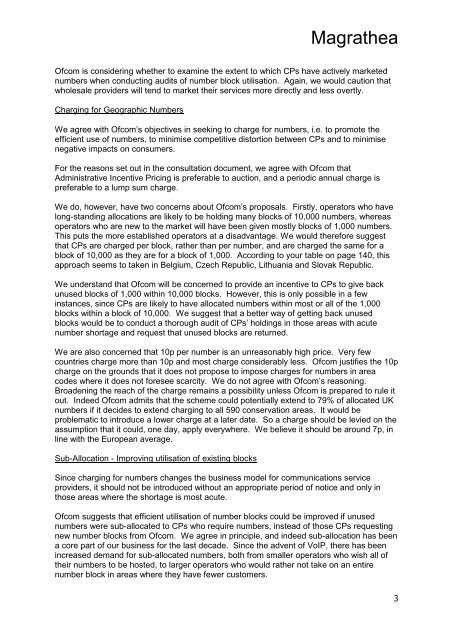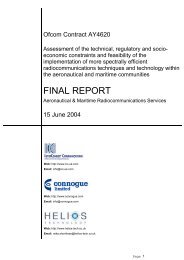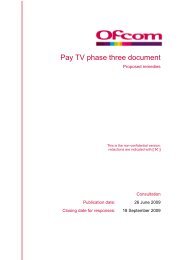Magrathea - Stakeholders - Ofcom
Magrathea - Stakeholders - Ofcom
Magrathea - Stakeholders - Ofcom
You also want an ePaper? Increase the reach of your titles
YUMPU automatically turns print PDFs into web optimized ePapers that Google loves.
<strong>Magrathea</strong><br />
<strong>Ofcom</strong> is considering whether to examine the extent to which CPs have actively marketed<br />
numbers when conducting audits of number block utilisation. Again, we would caution that<br />
wholesale providers will tend to market their services more directly and less overtly.<br />
Charging for Geographic Numbers<br />
We agree with <strong>Ofcom</strong>’s objectives in seeking to charge for numbers, i.e. to promote the<br />
efficient use of numbers, to minimise competitive distortion between CPs and to minimise<br />
negative impacts on consumers.<br />
For the reasons set out in the consultation document, we agree with <strong>Ofcom</strong> that<br />
Administrative Incentive Pricing is preferable to auction, and a periodic annual charge is<br />
preferable to a lump sum charge.<br />
We do, however, have two concerns about <strong>Ofcom</strong>’s proposals. Firstly, operators who have<br />
long-standing allocations are likely to be holding many blocks of 10,000 numbers, whereas<br />
operators who are new to the market will have been given mostly blocks of 1,000 numbers.<br />
This puts the more established operators at a disadvantage. We would therefore suggest<br />
that CPs are charged per block, rather than per number, and are charged the same for a<br />
block of 10,000 as they are for a block of 1,000. According to your table on page 140, this<br />
approach seems to taken in Belgium, Czech Republic, Lithuania and Slovak Republic.<br />
We understand that <strong>Ofcom</strong> will be concerned to provide an incentive to CPs to give back<br />
unused blocks of 1,000 within 10,000 blocks. However, this is only possible in a few<br />
instances, since CPs are likely to have allocated numbers within most or all of the 1,000<br />
blocks within a block of 10,000. We suggest that a better way of getting back unused<br />
blocks would be to conduct a thorough audit of CPs’ holdings in those areas with acute<br />
number shortage and request that unused blocks are returned.<br />
We are also concerned that 10p per number is an unreasonably high price. Very few<br />
countries charge more than 10p and most charge considerably less. <strong>Ofcom</strong> justifies the 10p<br />
charge on the grounds that it does not propose to impose charges for numbers in area<br />
codes where it does not foresee scarcity. We do not agree with <strong>Ofcom</strong>’s reasoning.<br />
Broadening the reach of the charge remains a possibility unless <strong>Ofcom</strong> is prepared to rule it<br />
out. Indeed <strong>Ofcom</strong> admits that the scheme could potentially extend to 79% of allocated UK<br />
numbers if it decides to extend charging to all 590 conservation areas. It would be<br />
problematic to introduce a lower charge at a later date. So a charge should be levied on the<br />
assumption that it could, one day, apply everywhere. We believe it should be around 7p, in<br />
line with the European average.<br />
Sub-Allocation - Improving utilisation of existing blocks<br />
Since charging for numbers changes the business model for communications service<br />
providers, it should not be introduced without an appropriate period of notice and only in<br />
those areas where the shortage is most acute.<br />
<strong>Ofcom</strong> suggests that efficient utilisation of number blocks could be improved if unused<br />
numbers were sub-allocated to CPs who require numbers, instead of those CPs requesting<br />
new number blocks from <strong>Ofcom</strong>. We agree in principle, and indeed sub-allocation has been<br />
a core part of our business for the last decade. Since the advent of VoIP, there has been<br />
increased demand for sub-allocated numbers, both from smaller operators who wish all of<br />
their numbers to be hosted, to larger operators who would rather not take on an entire<br />
number block in areas where they have fewer customers.<br />
3
















